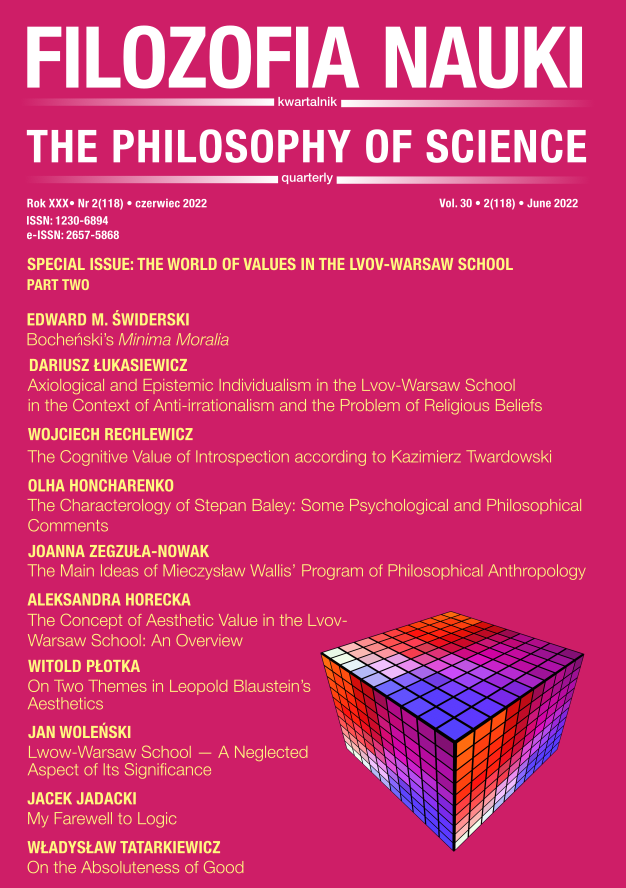On Two Themes in Leopold Blaustein’s Aesthetics
DOI:
https://doi.org/10.14394/filnau.2022.0021Keywords:
aesthetic experience, descriptive psychology, theory of presentations, Franz Brentano, Leopold BlausteinAbstract
The paper critically examines the thesis, popular in the literature, that Leopold Blaustein’s aesthetics is first and foremost a phenomenological discipline. I argue that the “phenomenological” nature of Blaustein’s philosophy follows from Brentano and Twardowski, rather than from Husserl. I therefore claim that Blaustein’s aesthetics is determined by two equally important themes: (1) a descriptive-psychological and (2) a “phenomenological” one. The article is structured as follows. The introduction situates Blaustein’s aesthetics within classical aesthetics. Section 1 reconstructs the Brentanian background of Blaustein’s aesthetics. Section 2 contains a discussion of Blaustein’s assessment of Twardowski’s theory of presentations, which is followed, in Section 3, by an analysis of Blaustein’s example descriptions of aesthetic experiences. These descriptions are discussed in Section 4, which also reconstructs the main elements of Blaustein’s phenomenology of aesthetic experiences. Against this background, the question of the alleged psychologism of Blaustein’s aesthetics is addressed in Conclusions.
References
Blaustein L. (1930), Przedstawienia imaginatywne. Studyum z pogranicza psychologii i estetyki [Imaginative Presentations: Study on the Borderline of Psychology and Aesthetics], Lwów: Wydawnictwo Polskiego Towarzystwa Filozoficznego we Lwowie.
Blaustein L. (1931), Przedstawienia schematyczne i symboliczne. Badania z pogranicza psychologji i estetyki [Schematic and Symbolic Presentations. Investigations from the Borderland of Psychology and Aesthetics], Lwów: Nakładem Przeglądu Humanistycznego.
Blaustein L. (1937), “Das imaginative Kunstwerk und seine Gegebenheitsweise” [in:] Deuxième Congrès International d’esthetique et de science de l’art, Paris, 1937, P. Valéry, P. Claudel, V. Basch (eds.), Paris: Librairie Félix Alcan, 245-249.
Blaustein L. (2005), Wybór pism estetycznych [A Selection of Aesthetic Writings], Z. Rosińska (ed.), Kraków: Universitas.
Blaustein L. (2011a), “Imaginary Representations: A Study on the Border of Psychology and Aesthetics,” transl. M. Bokiniec, Estetika: The Central European Journal of Aesthetics 48(2): 209-234.
Blaustein L. (2011b), “The Role of Perception in Aesthetic Experience,” transl. M. Bokiniec, Estetika: The Central European Journal of Aesthetics 48(2): 235-243.
Brentano F. (1995), Psychology from an Empirical Standpoint, transl. A. C. Rancurello, D. B. Terrell, L. L. McAlister, London: Routledge.
Brożek A. (2019), “Interpersonal and Intertextual Relations in the Lvov-Warsaw School” [in:] Interdisciplinary Investigations into the Lvov-Warsaw School, A. Drabarek, J. Woleński, M. M. Radzki (eds.), Cham: Palgrave Macmillan, 87-116. https://doi.org/10.1007/978-3-030-24486-6_6
Byrne T. (2020), “Smashing Husserl’s Dark Mirror: Rectifying the Inconsistent Theory of Impossible Meanings and Signitive Substance from the Logical Investigations,” Axiomathes 31(2): 127-144. https://doi.org/10.1007/s10516-020-09485-9
Byrne T. (2021), “‘Principally Unacceptable’ Theory: Husserl’s Rejection and Revision of His Philosophy of Meaning Intentions from the Logical Investigations,” Studia Phaenomenologica 20: 357-378. https://doi.org/10.5840/studphaen20202016
Chrudzimski A. (2001), Intentionalitätstheorie beim frühen Brentano, Dordrecht: Kluwer Academic Publishers. https://doi.org/10.1007/978-94-015-9668-8
Chrudzimski A. (2002), Von Brentano zu Ingarden. Die Phänomenologische Bedeutungslehre, “Husserl Studies” 18(3): 185-208. https://doi.org/10.1023/A:1020454505735
Dziemidok B. (1980), Teoria przeżyć i wartości estetycznych w polskiej estetyce dwudziestolecia międzywojennego [Theory of Aesthetic Experiences and Values in Polish Interwar Aesthetics], Warszawa: Państwowe Wydawnictwo Naukowe.
Huemer W. (2017), “Brentano on Beauty and Aesthetics” [in:] The Routledge Handbook of Franz Brentano and the Brentano School, U. Kriegel (ed.), New York: Routledge, 202-209. https://doi.org/10.4324/9781315776460-23
Ingarden R. (1963), “Leopold Blaustein — teoretyk radia i filmu” [Leopold Blaustein — The Theorist of Radio and Film], Zeszyty Prasoznawcze 4(3), 86-93.
Miskiewicz W. (2009), “Leopold Blaustein’s Analytical Phenomenology” [in:] The Golden Age of Polish Philosophy: Kazimierz Twardowski’s Philosophical Legacy, S. Lapointe, J. Woleński, M. Marion, W. Miskiewicz (eds.), Dordrecht: Springer, 181-188. https://doi.org/10.1007/978-90-481-2401-5_13
Paczkowska-Łagowska E. (1980), Psychika i poznanie. Epistemologia Kazimierza Twardowskiego [The Psyche and Cognition: The Epistemology of Kazimierz Twardowski], Warszawa: Państwowe Wydawnictwo Naukowe.
Pazura S. (1966), “Blaustein, Leopold” [in:] Słownik filozofów, t. I [The Dictionary of Philosophers, vol. 1], I. Krońska (ed.), Warszawa: Państwowe Wydawnictwo Naukowe, 90.
Płotka W. (2020a), “From Psychology to Phenomenology (and Back Again): A Controversy over the Method in the School of Twardowski,” Phenomenology and the Cognitive Sciences 19(1), 141-167. https://doi.org/10.1007/s11097-019-09620-x
Płotka W. (2020b), “Leopold Blaustein’s Descriptive Psychology and Aesthetics in Light of His Criticism of Husserl” [in:] Early Phenomenology in Central and Eastern Europe: Main Figures, Ideas, and Problems, W. Płotka, P. Eldridge (eds.), Cham: Springer, 163-185. https://doi.org/10.1007/978-3-030-39623-7_10
Płotka W. (2021a), “A Critical Analysis of Blaustein’s Polemic Against Husserl’s Method,” Husserl Studies 37(3): 249-270. https://doi.org/10.1007/s10743-021-09292-z
Płotka W. (2021b), Leopold Blaustein i jego fenomenologia: Źródła i konteksty (wraz z dodaniem “Husserlowskiej nauki o akcie, treści i przedmiocie przedstawienia”) [Leopold Blaustein and His Phenomenology: Sources and Context (With the Appendix of “Husserl’s Theory of Act, Content and Object of Presentation”)], Warszawa: Wydawnictwo IFiS PAN.
Ptaszek R. T. (2011), “Blaustein Leopold” [in:] Encyklopedia filozofii polskiej, T. 1, A-Ł [Encyclopedia of Polish Philosophy], A. Maryniarczyk et al. (eds.), Lublin: Polskie Towarzystwo Tomasza z Akwinu, 119-120.
Rosińska Z. (2005), “Leopold Blaustein — Styk psychologii i estetyki” [Leopold Blaustein — An Intersection of Psychology and Aesthetics] [in:] L. Blaustein, Wybór pism estetycznych [A Selection of Aesthetic Writings], Z. Rosińska (ed.), Kraków: Universitas, vii-lii.
Tănăsescu I. (2019), “Monism and Particularism: Methodology in Brentano’s Psychology,” Axiomathes 29(4): 397-412. https://doi.org/10.1007/s10516-019-09420-7
Twardowski K. (1892), Idee und Perception. Eine erkenntnis-theoretische Untersuchung aus Descartes, Wien: Verlag von Carl Konegen.
Twardowski K. (1924), O istocie pojęć, Lwów: Polskie Towarzystwo Filozoficzne.
Twardowski K. (1977), On the Content and Object of Presentations: A Psychological Investigation, transl. R. Grossmann, The Hague: Nijhoff. https://doi.org/10.1007/978-94-010-1050-4
Twardowski K. (1995), “Imageries,” transl. A. Lekka-Kowalik, Axiomathes 6(1): 79-104. https://doi.org/10.1007/BF02228903



















 Filozofia Nauki/The Philosophy of Science | ISSN 1230-6894 | e-ISSN 2657-5868
Filozofia Nauki/The Philosophy of Science | ISSN 1230-6894 | e-ISSN 2657-5868